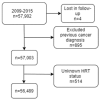Is Breast Cancer Risk Associated with Menopausal Hormone Therapy Modified by Current or Early Adulthood BMI or Age of First Pregnancy?
- PMID: 34072619
- PMCID: PMC8199436
- DOI: 10.3390/cancers13112710
Is Breast Cancer Risk Associated with Menopausal Hormone Therapy Modified by Current or Early Adulthood BMI or Age of First Pregnancy?
Abstract
Menopausal hormone therapy (MHT) has an attenuated effect on breast cancer (BC) risk amongst heavier women, but there are few data on a potential interaction with early adulthood body mass index (at age 20 years) and age of first pregnancy. We studied 56,489 women recruited to the PROCAS (Predicting Risk of Cancer at Screening) study in Manchester UK, 2009-15. Cox regression models estimated the effect of reported MHT use at entry on breast cancer (BC) risk, and potential interactions with a. self-reported current body mass index (BMI), b. BMI aged 20 and c. First pregnancy >30 years or nulliparity compared with first pregnancy <30 years. Analysis was adjusted for age, height, family history, age of menarche and menopause, menopausal status, oophorectomy, ethnicity, self-reported exercise and alcohol. With median follow up of 8 years, 1663 breast cancers occurred. BC risk was elevated amongst current users of combined MHT compared to never users (Hazard ratioHR 1.64, 95% CI 1.32-2.03), risk was higher than for oestrogen only users (HR 1.03, 95% CI 0.79-1.34). Risk of current MHT was attenuated by current BMI (interaction HR 0.80, 95% CI 0.65-0.99) per 5 unit increase in BMI. There was little evidence of an interaction between MHT use, breast cancer risk and early and current BMI or with age of first pregnancy.
Keywords: BMI; age of pregnancy; breast cancer risk; early BMI; menopausal hormone therapy.
Conflict of interest statement
The authors declare no conflict of interest. The funders had no role in the design of the study; in the collection, analyses, or interpretation of data; in the writing of the manuscript, or in the decision to publish the results.
Figures
Similar articles
-
Association between menopausal hormone therapy, mammographic density and breast cancer risk: results from the E3N cohort study.Breast Cancer Res. 2021 Apr 17;23(1):47. doi: 10.1186/s13058-021-01425-8. Breast Cancer Res. 2021. PMID: 33865453 Free PMC article.
-
Postmenopausal breast cancer risk and interactions between body mass index, menopausal hormone therapy use, and vitamin D supplementation: Evidence from the E3N cohort.Int J Cancer. 2016 Nov 15;139(10):2193-200. doi: 10.1002/ijc.30282. Epub 2016 Jul 30. Int J Cancer. 2016. PMID: 27451078
-
Is breast cancer risk the same for all progestogens?Arch Gynecol Obstet. 2014 Aug;290(2):207-9. doi: 10.1007/s00404-014-3270-0. Arch Gynecol Obstet. 2014. PMID: 24838289
-
Menopausal hormone therapy does not play a major role in left ventricular hypertrophy.Maturitas. 2010 Jun;66(2):212-8. doi: 10.1016/j.maturitas.2010.03.014. Epub 2010 Apr 20. Maturitas. 2010. PMID: 20409654 Review.
-
Menopausal Hormone Therapy in Breast Cancer Survivors.Cancers (Basel). 2024 Sep 26;16(19):3267. doi: 10.3390/cancers16193267. Cancers (Basel). 2024. PMID: 39409888 Free PMC article. Review.
Cited by
-
Special Issue "Gynaecological Cancers Risk: Breast Cancer, Ovarian Cancer and Endometrial Cancer".Cancers (Basel). 2022 Jan 10;14(2):319. doi: 10.3390/cancers14020319. Cancers (Basel). 2022. PMID: 35053483 Free PMC article.
-
Menopausal hormone therapy and breast cancer risk: a population-based cohort study of 1.3 million women in Norway.Br J Cancer. 2024 Jul;131(1):126-137. doi: 10.1038/s41416-024-02590-1. Epub 2024 May 13. Br J Cancer. 2024. PMID: 38740969 Free PMC article.
-
Exogenous Hormones, Tumor Intrinsic Subtypes, and Breast Cancer.JAMA Netw Open. 2025 Jul 1;8(7):e2519236. doi: 10.1001/jamanetworkopen.2025.19236. JAMA Netw Open. 2025. PMID: 40622713 Free PMC article.
References
-
- NICE . Familial Breast Cancer: Classification, Care and Managing Breast Cancer and Related Risks in People with a Family History of Breast Cancer. NICE Clinical Guidelines; London, UK: 2013. - PubMed
-
- NICE . Menopause: Diagnosis and Management. NICE Clinical Guidelines; London, UK: 2015.
LinkOut - more resources
Full Text Sources


